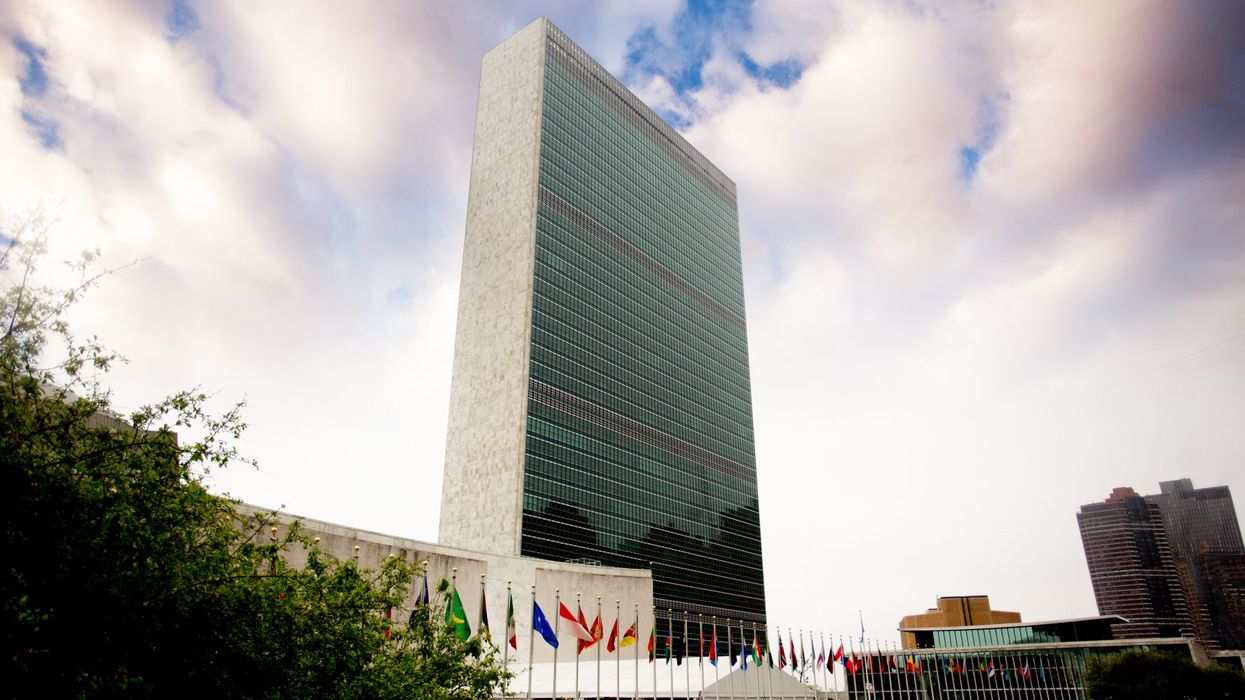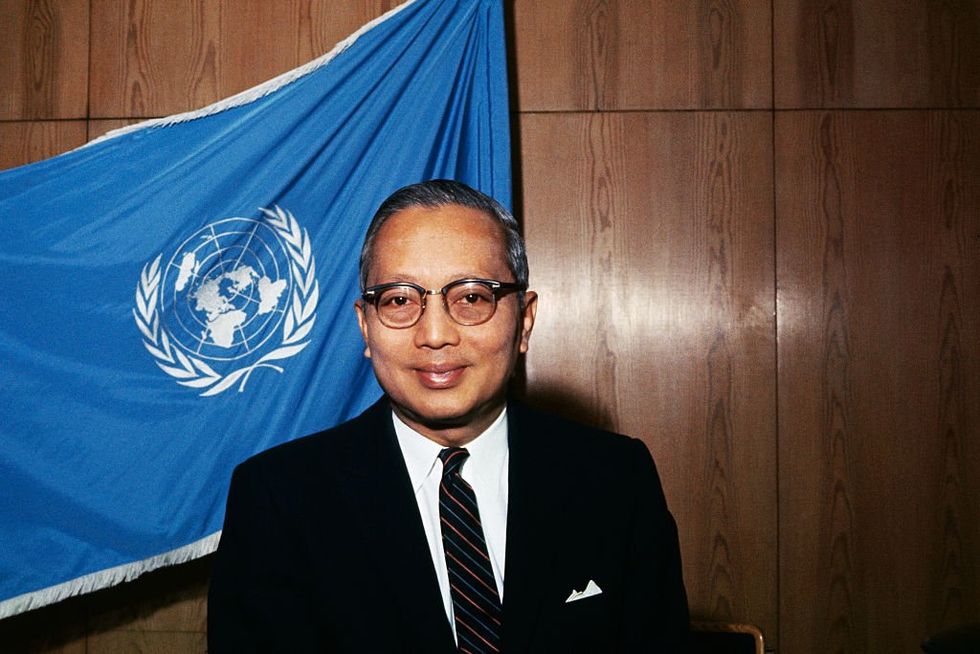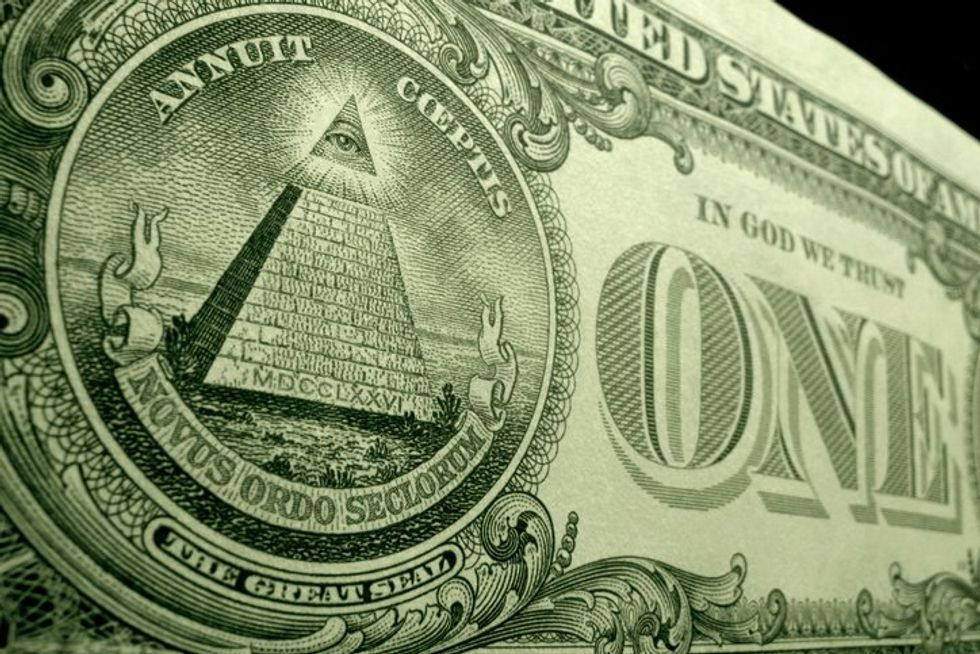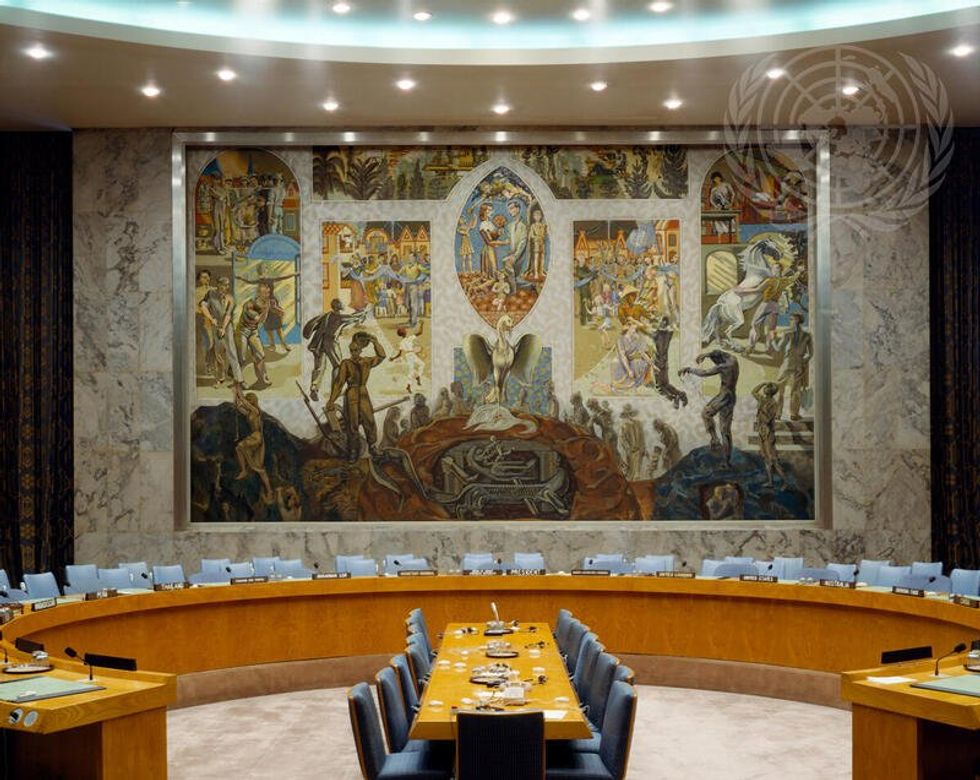
grandriver/Getty Images

An investigation into the dark origins of the UN.
This is the second part of a three-part investigation into the United Nations' origins and plans for the future of the world. You can read part one here.
The United Nations is a spiritual cult that draws its inspiration from a diverse set of influences, including Alice Bailey’s theosophy. Her teachings provided the foundations of the spiritual beliefs of the United Nations. Another strong influence was the “deeply spiritual” Robert Muller, who “from his vantage point of a top level global states-person [saw] a strong connection between spirituality and the political/cultural scene.” While Robert Muller’s and Alice Bailey’s beliefs may both generally be called theosophical, it is important to understand Robert Muller's material and spiritual impact on the United Nations: His contributions were and are a crucial guide for the United Nations in practice.
Robert Muller, born in Belgium in 1923 and raised in the Alsace-Lorraine region of France, grew up to experience “the horrors of World War II, of being a refugee, of Nazi occupation, and imprisonment.” He was a part of the French Resistance and later earned a doctorate of law from the University of Strasbourg. Clearly, his upbringing in the wake of these conflicts between countries shaped his worldview and politics.
Then, interestingly, “In 1948 he entered and won an essay contest on how to govern the world, the prize of which was an internship at the newly created United Nations.” Evidently, Muller was a life-long believer and advocate of alternate modes of governance, which he clearly believed the United Nations represented. He climbed the ranks of the United Nations all the way to the status of assistant secretary-general of the United Nations, a position he held for over 30 years. He dedicated himself to his writings, earning himself the moniker of the “philosopher” and even the “Prophet of Hope” of the United Nations. He also had several more concrete achievements, such as his work in education.

One of the fruits of Robert Muller’s long career was the University for Peace in Costa Rica, which he called “this magnificent dream being implemented in Costa Rica, a totally disarmed heaven of peace in a region still troubled by conflict.” He went on to explain that schools like the University for Peace would make students realize their “cosmic function” of becoming “instruments for peace”: “I hope that the University for Peace will establish a global peace strategy which would reach from outer-space to the atom, encompassing all aspects of our planetary home, the atmosphere, the seas and oceans, the polar caps, the continents, nations, regions, cities and villages; and from the whole human family to the individual, encompassing races, peoples, cultures, religions, generations, professions, institutions, firms, the family and all groups and associations created by the human race to attain a greater level of happiness and fulfilment.” After his retirement at the U.N., he served as Chancellor Emeritus at the University for Peace until his death in 2010.
Robert Muller invented the World Core Curriculum, for which he won the UNESCO Peace Education Prize in 1989. He believed that the world, moving into the 21st century, could not go on without a new education. One of his inspirations for designing the WCC was his “spiritual master,” U Thant, the third secretary-general of the U.N.: "Robert, there will be no peace on Earth, if there is not a new education." It will become clear that the adoption of the World Core Curriculum and the expansion of the United Nations’ power is mutually reinforcing.
What would this new education entail? Muller was convinced that we are now in the “global age” of human evolution, which meant that any conception of education that was not holistic in scope and global in its reach is necessarily insufficient. He also criticized the “[n]ationalistic mis-educations of France, Germany, and the United States.” Therefore, the scope of the United Nations is expansive and universal: “Our next great evolutionary task will be to ascertain what this cosmic or divine pattern means and to prepare for it the right institutions, people, values, guidelines, laws, philosophy, politics, and ethics. This immense, unprecedented task is dawning upon us everywhere, piercing the core of our earlier beliefs, values, and institutions.”
This may raise some eyebrows, but then he went on to explain the practical purpose of the new education, which is essentially to create more U.N. bureaucrats and global citizens: “This gives the teachers of this world a marvelous opportunity to teach children and people a sense of participation and responsibility in the building and management of the Earth, of becoming artisans of the will of God and of our further human ascent. A new world morality and world ethics will thus evolve, and teachers will be able to prepare responsible citizens, workers, scientists, geneticists, physicists, and scores of other professionals, including a new one which is badly needed–good world managers and caretakers.”
He then put a sharper point on the role of the United Nations in this new education: “The United Nations and its specialized agencies offer the first examples at global management in all these fields and must therefore occupy a cardinal place in the world’s curricula. The earlier we do this, the better it will be for our survival, fulfillment, and happiness.” The U.N. has been building credibility for itself by posing as the authority in all aspects of life in the post-war era. It does not claim to run the world now, but it would be “better for our survival” if it was in charge. Therefore, the adoption of a new, global education system would implicitly cede a huge amount of authority to the U.N., which is one avenue for it to achieve its goal of evolving the human race.

Robert Muller’s ideas cannot be understood without first understanding that he believed that the human race has been evolving, and that this evolution expands to the spiritual level in the global age. Hence the inclusion of a spiritual aspect in his curriculum: “Spiritual exercises of interiority, meditation, prayer and communion with the universe and eternity or God.” Note the nonchalance of his attitude toward pantheism versus monotheism since the "highest principle" can either be “the universe or God” for Muller. Spirituality and human (spiritual) evolution pervade much of his other writings as well, which is where we will turn now.
Robert Muller wrote a book called "New Genesis: Shaping a Global Spirituality." A cursory glance at the table of contents will dispel any lingering doubts that Robert Muller shared many beliefs with the Lucis Trust and theosophy.
Two of his most important claims in the book are that all the religions of the world need to learn from each other and blend their beliefs in order to achieve a higher truth and that the United Nations is “the place of convergence of all human problems, dreams, aspirations and exertions,” that is, it is in a position to develop this collaboration: “The answers, of course, have varied greatly during human history: thousands of religions, (with or without God or gods, e.g., Buddhism, Jainism, and Sikhism), philosophies and spiritual practices have offered humans their manifold insights and beliefs. Most of them thought that they had the ultimate, total truth or universal principle, and they were all too often prone to fight each other to assert their belief.”
As an aside, compare this to the explanation of the “Second Object” of the Theosophical Society: “Different world cultures have different approaches to intellectual and spiritual activities, and all such cultural differences are worth paying attention to, because reality is richer and more complex than any one culture can fully comprehend.” This is called syncretism. Much more could be said about syncretism, but this is not the place for it. For now, see the horrific seal of the Theosophical Society to get an idea of what it stands for. (Hint: If you are open to anything and everything, you stand for nothing).
Muller was clearly interested in making spirituality a greater focus for the United Nations. In fact, he seemed to think that spirituality is central in many ways to the work of the U.N.: “When it comes to the United Nations proper, one can obviously not say that it is a spiritual organization. How could it be otherwise? ... Nevertheless, prayer and spirituality play an important role in the United Nations.” It is interesting that he made these two statements in the same breath, as it were. One way of reading what Muller said is that the United Nations has concerns other than spiritual ones, but those concerns are guided by a spiritual awareness and purpose.
He highlighted this in a strange footnote in the book in which he says, “It is symbolic that the new Secretary-General, Mr. Javier Perez de Cuellar, on the first day of his term in January, 1982, visited the U.N. Meditation Room before proceeding to his office.” Symbolic of what, exactly? Recall that the U.N. Meditation Room is utterly devoid of religious symbols yet represents the spirituality that the U.N. pursues and encourages. Mr. Cuellar’s homage to the Meditation Room, then, suggests two things: First, the new secretary-general understands the importance of the spiritual component of the United Nations; second, the spirituality that led to the creation of the Meditation Room continued at the highest levels of the U.N. for the first 30 years of its existence, at least. His visit merely reaffirms the broader commitment of the U.N. It seems that his visit to the U.N. Meditation Room is “symbolic” of the way in which he intends to conduct the U.N. under his leadership.

Robert Muller was a self-proclaimed Catholic, so one might assume that he privileged Catholicism in his religious thought. This is clearly a false assumption based on his writings, however. It is difficult to choose which example to use since there are so many instances where he blasphemes his own purported religious beliefs. I will let this quote speak for itself: “There is a famous painting and poster which shows Christ knocking at the tall United Nations building, wanting to enter it. I often visualize in my mind another even more accurate painting: that of a United Nations which would be the body of Christ.”
How could Muller say these things about Christ if he called himself a faithful Catholic? The Lucis Trust offers a compelling answer that resolves this contradiction. He was talking about a different figure, The Christ: “The Christ has no religious barriers in His consciousness. It matters not to Him of what faith a man may call himself.” For theosophists, The Christ is known as Lord Maitreya, but he takes on the different forms from all of the world religions. Jesus of Nazareth is, according to them, one instance of The Christ in world history. People need to be aware of this double-speak because Muller and many other figures in the cult of spiritual evolution appropriate different world religions to advance their religious beliefs in the guise of familiarity.
The best example of this comes at the end of "New Genesis." Muller boldly (i.e. blasphemously) rewrote the Genesis story with the United Nations as the new focus and with God nodding his approval: “And God saw that all the nations of the earth, black and white, poor and rich, from North and South, from East and West, and of all creeds were sending their emissaries to a tall glass house on the shores of the River of the Rising Sun, on the island of Manhattan, to study together, to think together, and to care together for the world and all its people. And God said: ‘That is good.’ And it was the first day of the New Age of the earth.” Remember what Muller wanted as the new body of Christ? He was talking about the same United Nations headquarters building in Manhattan, New York.
This is progress. This is spiritual evolution. This is what Robert Muller hoped and believed would happen in humanity’s future. This is what the United Nations aims to achieve.
Reflecting on his life achievements and contributions, Robert Muller depicted himself in a conversation with God himself. God asked him what he thought was his most important idea that he ever had, and Muller responded: “THE UNITED NATIONS MUST BE VASTLY STRENGTHENED TO RESOLVE THE MAJOR GLOBAL PROBLEMS HENCEFORTH INCREASINGLY CONFRONTING HUMANITY AND THE EARTH. IT MUST BE EMPOWERED TO ADOPT AND ENFORCE WORLD LAWS AND REGULATIONS.” Of all of his 7000 Ideas for a better future, Muller ranked this as his most crucial insight. Robert Muller truly dedicated his entire life to creating a New World Order under the United Nations’ rule.
One thing stands in the way of this New Age of human evolution coming into being: The United States and the rest of the free world. Muller, however, was assured that the U.S. will be unable to stand against the force of progress for long. Writing in May 2000, Muller said: “And now, as I look to the future and further progress, I am told that proper Earth government is impossible! I make this prediction: within twenty years we will have a proper government and administration of planet Earth and of humanity… It is inevitable. The salvation of this planet and survival of the human species depend on it. No one can for long go against evolution. Nation-states must adapt or they will disintegrate, even the biggest one, the United States. Unknown forces will force them to.”
We must remember these words next time we are told that there is a global crisis in the world that needs managing. If we don’t, we will almost certainly find ourselves living in Robert Muller’s world.
Cooper Williamson